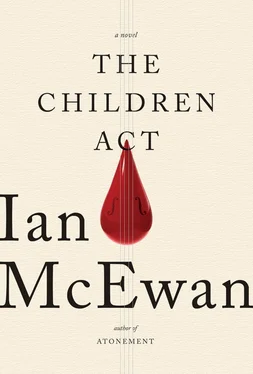Grieve said, “You accept, do you not, Mr. Carter, that the freedom of choice of medical treatment is a fundamental human right in adults?”
“I do.”
“And treatment without consent would constitute a trespass of the person, or indeed an assault of that person.”
“I agree.”
“And Adam is close to being an adult, as the law defines it in such instances.”
Carter said, “If his eighteenth birthday was tomorrow morning, he would not yet have attained his majority today.”
This was said with vehemence. Grieve was unruffled. “Adam is very nearly an adult. Is it not the case that he has expressed his view to treatment intelligently and articulately?”
At this point, the consultant’s stoop vanished and he grew another inch. “His views are those of his parents. They’re not his own. His objection to being transfused is based on the doctrines of a religious cult for which he may well become a pointless martyr.”
“Cult is a strong word, Mr. Carter,” Grieve said quietly. “Do you yourself have any religious belief?”
“I’m an Anglican.”
“Is the Church of England a cult?”
Fiona looked up from her note-taking. Grieve acknowledged her by pursing his lips and pausing on a long intake of breath. The doctor looked as if he was set to leave the stand, but the barrister had not finished with him.
“Are you aware, Mr. Carter, that the World Health Organization estimates that between fifteen and twenty percent of new AIDS cases are caused by blood transfusions?”
“No such cases have occurred in my hospital.”
“The hemophiliac communities of various countries have suffered the tragedy of AIDS infection on a massive scale, have they not?”
“That was a good while ago and no longer happens.”
“And other infections are possible via transfusion, are they not? Hepatitis, Lyme disease, malaria, syphilis, Chagas disease, graft-versus-host disease, transfusion-related lung disease. And, of course, variant CJD.”
“All exceedingly rare.”
“But known to occur. And then there are hemolytic reactions due to mismatched blood groups.”
“Also rare.”
“Really? Let me quote to you, Mr. Carter, from the highly respected Manual for Blood Conservation : ‘There are at least twenty-seven stages between taking a blood sample and the recipient receiving their transfusion and there is potential for error at each stage of the process.’”
“Our staff are highly trained. They take great care. I don’t recall a single hemolytic reaction in years.”
“If we added all these dangers up, wouldn’t you say there was enough to give a rational person pause, Mr. Carter, without that person being a member of what you call a cult?”
“These days, blood products are tested to the highest standards.”
“Nevertheless, it would not be wholly irrational to hesitate before accepting to be transfused.”
Carter thought for a moment. “Hesitate, perhaps, at a stretch. But to refuse in a case like Adam’s would be irrational.”
“You accept that hesitation is in order. So it wouldn’t be unreasonable, surely, given all the possibilities of infection and error, for the patient to insist that his consent be sought.”
The consultant made a show of self-control. “You’re playing with words. If I’m not permitted to transfuse this patient, he may not recover. At the very least he could lose his sight.”
Grieve said, “Isn’t there something like an ill-considered fashion in your profession for transfusion, given the risks? It’s not evidence-based, is it, Mr. Carter? It’s rather like bloodletting in the old days, except, of course, in reverse. Patients who lose a third of a pint of blood during surgery are routinely transfused, no? And yet a donor gives up a whole pint and goes straight back to work afterward, and no harm done.”
“I can’t comment on the clinical judgment of others. The general view, I suppose, is that a patient weakened by surgery should have all the blood that God allotted.”
“Isn’t it the case that Jehovah’s Witness patients are regularly treated now by what’s called bloodless surgery? No transfusions are necessary. Allow me to quote to you from the American Journal of Otolaryngology : ‘Bloodless surgery has come to represent good practice, and in the future it may well be the accepted standard of care.’”
The consultant was dismissive. “We’re not talking of surgery here. This patient needs blood because his treatment prevents him from making his own. It’s as simple as that.”
“Thank you, Mr. Carter.”
Grieve sat down and John Tovey, who appeared to depend on a cane with a silver head and who was counsel for Adam Henry, breathily got to his feet to cross-examine the consultant.
“You’ve clearly spent time alone in conversation with Adam.”
“I have.”
“Have you formed an impression as to his intelligence?”
“Extremely intelligent.”
“Is he articulate?”
“Yes.”
“Is his judgment, his cognition, clouded by his medical condition?”
“Not as yet.”
“Have you suggested to him that he needs a transfusion?”
“I have.”
“And what has been his response?”
“He firmly refuses it on the grounds of his religion.”
“Are you aware of his exact age in years and months?”
“He’s seventeen years and nine months.”
“Thank you, Mr. Carter.”
Berner rose to reexamine.
“Mr. Carter, will you remind me again how long you’ve specialized in hematology?”
“Twenty-seven years.”
“What are the risks of an adverse reaction to a blood transfusion?”
“Very low. Nothing compared to the certain damage that will be done in this case by failing to transfuse.”
Berner indicated that he had nothing more to ask.
Fiona said, “In your opinion, Mr. Carter, how much time do we have to resolve this matter?”
“If I can’t give blood to this boy by tomorrow morning we’ll be in very dangerous territory.”
Berner sat. Fiona thanked the doctor, who left with a curt, possibly resentful nod toward the bench. Grieve got to his feet and said he would call the father straightaway. When Mr. Henry came to the stand, he asked if he might swear on the New World Translation. The clerk told him there was only the King James. Mr. Henry nodded and swore on it, then settled his gaze patiently on Grieve.
Kevin Henry stood around five foot six and looked as lithe and strong as a trapeze artist. He may have been adept with a mechanical digger, but he looked equally at home in his well-cut gray suit and pale green silk tie. The drift of Leslie Grieve’s questions was to draw from him a picture of early struggle, then the blossoming of a loving, stable and happy family. Who could doubt it? The Henrys had married young, at nineteen, seventeen years ago. The early years, when Kevin was employed as a laborer, were hard. He was “a bit of a wild man,” drank too much, was abusive to his wife, Naomi, though he never hit her. He was eventually sacked for being too often late for work. The rent was overdue, the baby cried through the night, the couple rowed, the neighbors complained. The Henrys were threatened with eviction from their one-bedroom flat in Streatham.
Deliverance came in the form of two polite young men from America who doorstepped Naomi one afternoon. They came back the next day and spoke to Kevin, who was hostile at first. Finally, a visit to the nearest Kingdom Hall, a kindly welcome and then, slowly, through meeting some nice people who soon became friends, and helpful talks with wise elders of the congregation, and then Bible study, which they found hard at first—slowly, order and peace came into their lives. Kevin and Naomi began to live in the truth. They learned of the future that God had in store for mankind and they fulfilled their duty by working to spread the word. They discovered that there would be a paradise on earth and they could be a part of it by belonging to that privileged group known to the Witnesses as “other sheep.”
Читать дальше












